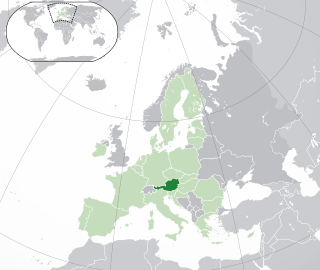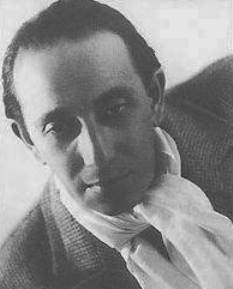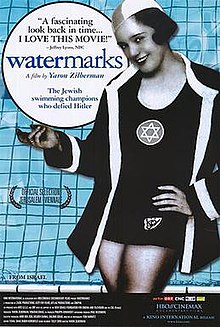
Matthias Sindelar was an Austrian professional footballer. Regarded as one of the greatest Austrian players of all time, Sindelar notably played for Austria Vienna and the national side.

The history of the Jews in Austria probably begins with the exodus of Jews from Judea under Roman occupation. There have been Jews in Austria since the 3rd century CE. Over the course of many centuries, the political status of the community rose and fell many times: during certain periods, the Jewish community prospered and enjoyed political equality, and during other periods it suffered pogroms, deportations to concentration camps and mass murder, and antisemitism. The Holocaust drastically reduced the Jewish community in Austria and only 8,140 Jews remained in Austria according to the 2001 census. Today, Austria has a Jewish population of 10,300 which extends to 33,000 if Law of Return is accounted for, meaning having at least one Jewish grandparent.

Judith Deutsch-Haspel was a swimming champion who held every Austrian women's middle and long distance freestyle record in 1935.

Paul Abraham was a Jewish-Hungarian composer of operettas, who scored major successes in the German-speaking world. His specialty – and own innovation – was the insertion of jazz interludes into operettas.

Leopold Engleitner was an Austrian conscientious objector, as one of Jehovah's Witnesses, and a concentration camp survivor who spoke publicly and with students about his experiences. He was the subject of the documentary Unbroken Will. Before his death, Engleitner was the world's oldest known male concentration camp survivor, and the oldest male Austrian.

SC Hakoah Vienna is a Jewish sports club in Vienna, Austria.
Fritz Löhner-Beda, born Bedřich Löwy, was an Austrian librettist, lyricist and writer. Once nearly forgotten, many of his songs and tunes remain popular today. He was murdered in Auschwitz III Monowitz concentration camp.

Franz Friedrich 'Fritz' Grünbaum was an Austrian Jewish cabaret artist, operetta and popular song writer, actor, and master of ceremonies whose art collection was looted by Nazis before he was murdered in the Holocaust.

Fighter is a documentary film about Arnošt Lustig (1926–2011) and Jan Wiener (1920–2010), two Jews who return to Europe to revisit the past.
Anja Salomonowitz is an Austrian film director and screenwriter, specialised on documentary films with political or social background.

Joseph Beer was a composer who worked mainly in the genres of operettas, singspiele, and operas.
Nickolaus "Mickey" Hirschl was an Austrian Olympic-medal-winning wrestler. He was also a European heavyweight wrestling champion, and for 10 years held the title of Austrian heavyweight wrestling champion. He was also an Austrian shot put and discus junior champion, Austrian heavyweight weightlifting junior champion, and for seven years the Austrian pentathlon champion.

Hermann Leopoldi was an Austrian composer and cabaret star who survived Dachau and Buchenwald. Einzi Stolz, wife of composer Robert Stolz, remembered him thus:

Hedwig "Hedy" Bienenfeld, also known after marriage as Hedy Wertheimer was an Austrian Olympic swimmer. She won a bronze medal in the 200m breaststroke at the 1927 European Aquatics Championships. She competed in the same discipline at the 1928 Summer Olympics. At the 1932 Maccabiah Games and 1935 Maccabiah Games in Mandatory Palestine, she won a combined five gold medals, one silver medal, and one bronze medal in swimming.

Friederike "Fritzi" Löwy was an Austrian Olympic swimmer. She won a bronze medal in the 400 m freestyle at the 1927 European Aquatics Championships. That same year she set the European record in the 200m freestyle. She competed in freestyle at the 1928 Summer Olympics, but did not reach the finals.

Polnische Hochzeit is a 1937 operetta by the Polish Jewish composer Joseph Beer to a libretto by his mentor Fritz Löhner-Beda and Alfred Grünwald, which premiered on 3 April 1937 at the Zürich Opera House. The Austrian premiere followed on 6 November 1937 in Linz. The operetta received spectacular success. Within a few years it was performed throughout Europe on some 40 stages and translated into eight languages.
Yaron Zilberman is an Israeli-American director, screenwriter and producer.
Ruth Langer, later known as Ruth Lawrence, was an Austrian swimmer who competed both nationally and internationally. Langer won several national titles, beginning at age 14 when she established the Austrian records for the 100m and 400m freestyle, and won the Austrian championship that year. She won a bronze medal at the 1935 Maccabiah Games in Mandatory Palestine, in the 200 m breaststroke. Selected for the Austrian Olympic Team, which was due to compete in the 1936 Summer Olympics in Nazi Germany, she refused to participate, as a protest against the Nazi regime in Germany and their antisemitism. In retaliation, Langer was banned for life by the Austrian Swimming Federation from competing in Austria. The lifetime ban was not lifted until 60 years later, at which time the Republic of Austria and the Austrian Swimming Federation officially apologized to her, and reinstated her titles and honors which they had repealed.
Richard Fall was an Austrian composer and conductor of Jewish descent. One of his most famous compositions is the popular Was machst du mit dem Knie lieber Hans.












